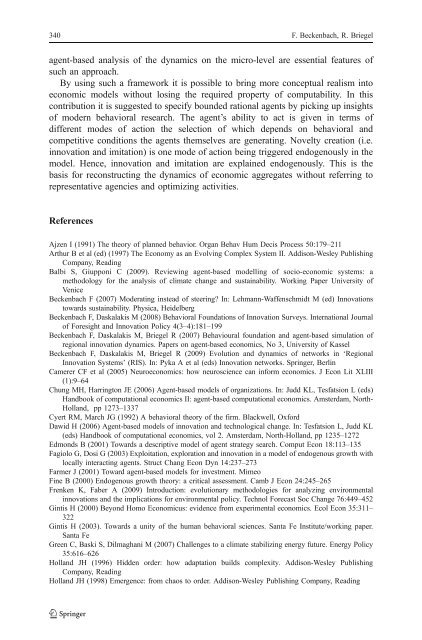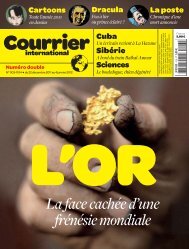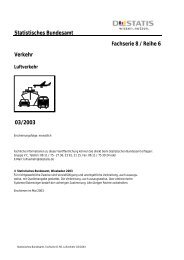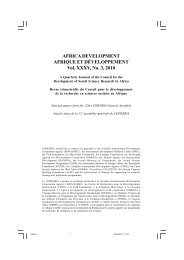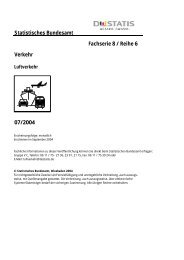The international economics of resources and resource ... - Index of
The international economics of resources and resource ... - Index of
The international economics of resources and resource ... - Index of
You also want an ePaper? Increase the reach of your titles
YUMPU automatically turns print PDFs into web optimized ePapers that Google loves.
340 F. Beckenbach, R. Briegel<br />
agent-based analysis <strong>of</strong> the dynamics on the micro-level are essential features <strong>of</strong><br />
such an approach.<br />
By using such a framework it is possible to bring more conceptual realism into<br />
economic models without losing the required property <strong>of</strong> computability. In this<br />
contribution it is suggested to specify bounded rational agents by picking up insights<br />
<strong>of</strong> modern behavioral research. <strong>The</strong> agent’s ability to act is given in terms <strong>of</strong><br />
different modes <strong>of</strong> action the selection <strong>of</strong> which depends on behavioral <strong>and</strong><br />
competitive conditions the agents themselves are generating. Novelty creation (i.e.<br />
innovation <strong>and</strong> imitation) is one mode <strong>of</strong> action being triggered endogenously in the<br />
model. Hence, innovation <strong>and</strong> imitation are explained endogenously. This is the<br />
basis for reconstructing the dynamics <strong>of</strong> economic aggregates without referring to<br />
representative agencies <strong>and</strong> optimizing activities.<br />
References<br />
Ajzen I (1991) <strong>The</strong> theory <strong>of</strong> planned behavior. Organ Behav Hum Decis Process 50:179–211<br />
Arthur B et al (ed) (1997) <strong>The</strong> Economy as an Evolving Complex System II. Addison-Wesley Publishing<br />
Company, Reading<br />
Balbi S, Giupponi C (2009). Reviewing agent-based modelling <strong>of</strong> socio-economic systems: a<br />
methodology for the analysis <strong>of</strong> climate change <strong>and</strong> sustainability. Working Paper University <strong>of</strong><br />
Venice<br />
Beckenbach F (2007) Moderating instead <strong>of</strong> steering? In: Lehmann-Waffenschmidt M (ed) Innovations<br />
towards sustainability. Physica, Heidelberg<br />
Beckenbach F, Daskalakis M (2008) Behavioral Foundations <strong>of</strong> Innovation Surveys. International Journal<br />
<strong>of</strong> Foresight <strong>and</strong> Innovation Policy 4(3–4):181–199<br />
Beckenbach F, Daskalakis M, Briegel R (2007) Behavioural foundation <strong>and</strong> agent-based simulation <strong>of</strong><br />
regional innovation dynamics. Papers on agent-based <strong>economics</strong>, No 3, University <strong>of</strong> Kassel<br />
Beckenbach F, Daskalakis M, Briegel R (2009) Evolution <strong>and</strong> dynamics <strong>of</strong> networks in ‘Regional<br />
Innovation Systems’ (RIS). In: Pyka A et al (eds) Innovation networks. Springer, Berlin<br />
Camerer CF et al (2005) Neuro<strong>economics</strong>: how neuroscience can inform <strong>economics</strong>. J Econ Lit XLIII<br />
(1):9–64<br />
Chung MH, Harrington JE (2006) Agent-based models <strong>of</strong> organizations. In: Judd KL, Tesfatsion L (eds)<br />
H<strong>and</strong>book <strong>of</strong> computational <strong>economics</strong> II: agent-based computational <strong>economics</strong>. Amsterdam, North-<br />
Holl<strong>and</strong>, pp 1273–1337<br />
Cyert RM, March JG (1992) A behavioral theory <strong>of</strong> the firm. Blackwell, Oxford<br />
Dawid H (2006) Agent-based models <strong>of</strong> innovation <strong>and</strong> technological change. In: Tesfatsion L, Judd KL<br />
(eds) H<strong>and</strong>book <strong>of</strong> computational <strong>economics</strong>, vol 2. Amsterdam, North-Holl<strong>and</strong>, pp 1235–1272<br />
Edmonds B (2001) Towards a descriptive model <strong>of</strong> agent strategy search. Comput Econ 18:113–135<br />
Fagiolo G, Dosi G (2003) Exploitation, exploration <strong>and</strong> innovation in a model <strong>of</strong> endogenous growth with<br />
locally interacting agents. Struct Chang Econ Dyn 14:237–273<br />
Farmer J (2001) Toward agent-based models for investment. Mimeo<br />
Fine B (2000) Endogenous growth theory: a critical assessment. Camb J Econ 24:245–265<br />
Frenken K, Faber A (2009) Introduction: evolutionary methodologies for analyzing environmental<br />
innovations <strong>and</strong> the implications for environmental policy. Technol Forecast Soc Change 76:449–452<br />
Gintis H (2000) Beyond Homo Economicus: evidence from experimental <strong>economics</strong>. Ecol Econ 35:311–<br />
322<br />
Gintis H (2003). Towards a unity <strong>of</strong> the human behavioral sciences. Santa Fe Institute/working paper.<br />
Santa Fe<br />
Green C, Baski S, Dilmaghani M (2007) Challenges to a climate stabilizing energy future. Energy Policy<br />
35:616–626<br />
Holl<strong>and</strong> JH (1996) Hidden order: how adaptation builds complexity. Addison-Wesley Publishing<br />
Company, Reading<br />
Holl<strong>and</strong> JH (1998) Emergence: from chaos to order. Addison-Wesley Publishing Company, Reading


